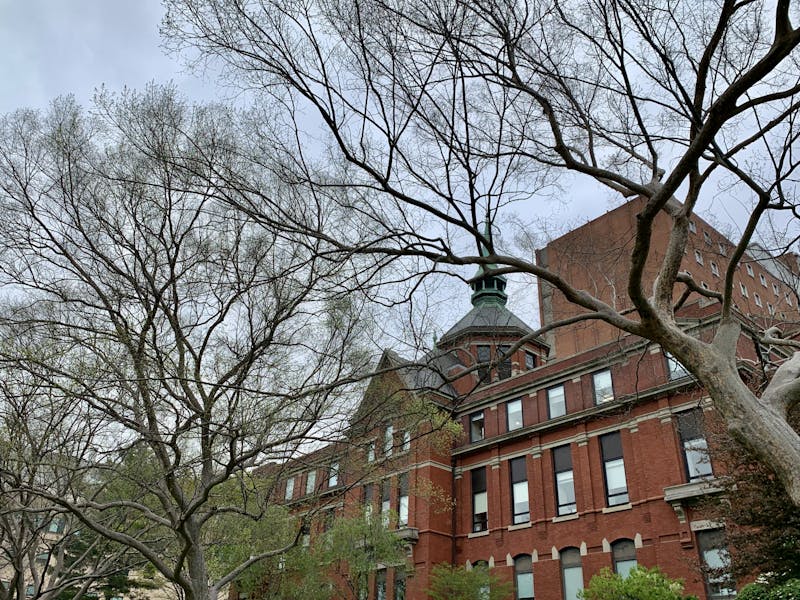
COURTESY OF KATY WILNER
Hopkins Hospital has used hardball tactics to sue thousands of Black and low-income patients in East Baltimore.

COURTESY OF KATY WILNER
Hopkins Hospital has used hardball tactics to sue thousands of Black and low-income patients in East Baltimore.
Last spring, Hopkins Hospital paused its long-time practice of suing patients who could not afford their medical treatments.
Activists have fought against the University’s aggressive medical debt collection tactics for years. As recently as last month, End Medical Debt Maryland hosted a rally to advocate for the Medical Debt Protection Act, which passed in this year’s Maryland General Assembly. The rally distributed information from ACLU of Maryland’s Know Your Rights program, detailing services and resources for individuals targeted by the Hospital.
Because the University is a tax-exempt nonprofit, it is required by law to provide community benefits, such as offering medical services to those who demonstrate need for free or at a reduced cost. However, as highlighted in a 2019 report by National Nurses United (NNU) and the Coalition for a Humane Hopkins, many defendants were never informed about these resources.
The report, titled “Taking Neighbors to Court: Johns Hopkins Hospital Medical Debt Lawsuits,” found that since 2009 the Hospital has filed more than 2,400 lawsuits in various Maryland courts in an effort to obtain $4.8 million in alleged medical debt from former patients. The Hospital used hardball tactics to sue for a median amount of $1,089, bankrupting nearly 50 patients. The majority of individuals that were sued are residents of Baltimore, and 86% of the defendants were Black.

FILE PHOTO
End Medical Debt Maryland held a rally in April in support of the Medical Debt Protection Act, which awaits Governor Hogan’s signature.
Dr. Zackary Berger, an associate professor in the Division of General Internal Medicine in the Department of Medicine with a joint appointment in the School of Public Health, provides primary care at the Hospital. In an interview with The News-Letter, Berger called on the University to better serve the city.
“Like other medical centers, Hopkins has had a pattern of exploiting the community for its own ends, both historically and in the present day,” he said. “That is the honest summary of the institution’s impact.”
Berger explained that because of his work as a physician, he comes into direct contact with patients who are in the middle of medical debt battles with the Hospital.
“I have one patient who’s told me several times that she’s received calls from Hopkins lawyers, and they’re talking about having her income garnished,” he said. “This is not someone who can afford to have their wages interrupted.”
The Hospital has used wage garnishments as a tactic for over 400 cases since 2009 to get defendants to pay medical bills. By obtaining a court judgment, Hopkins can force employers to withhold earnings from patients’ paychecks; the employer with the most garnishment requests is Hopkins itself, accounting for 10% of all garnishment actions.
In a testimonial in the 2019 report, Eric Simmons shared how he sustained an injury in 2013 that caused him to lose his job. After finding a new job at Amazon, the Hospital sued him for $524 and subsequently garnished his wages through his new employer.
“I was never offered charity care. You withheld information from me, information that could have helped me and my family live more prosperously,” he said. “Years later, we’re still playing catch-up.”
Although patients face insurmountable debt at the hands of the Hospital, Berger finds that many doctors avoid discussing the price of treatments with patients.
“I always ask the resident doctors I work with if this patient can even afford their medicines,” he said. “They’ll say, ‘Well, we didn’t mention it.’ That’s because no one wants to talk about money, especially with their doctors. So when people bring up debt unannounced, it indicates that it’s just the tip of the iceberg and a real, serious issue.”
Berger explained that individual actors at Hopkins are working within the community to provide additional and necessary care. However, he believes that the institution as a whole must counteract its negative impact on the city and effect real change.
“The short answer, to me, is providing more free care to people, more free medicine,” he said. “We are in the middle of a pandemic; this is the right time to do it. We’re sitting on large cash reserves. Is this not the rainy for which rainy day funds were created?”